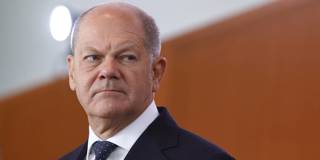Germany escaped its post-reunification economic slump thanks to decisive action by determined leaders, bolstered by true belief in the European project. Whether the same will happen today – when Germany is facing many of the same conditions that prevailed in the 1990s – is far from clear.
MADRID – Once the “sick man of Europe,” Germany seems to be under the weather once again. That might be putting it mildly: much as it did in the late 1990s, Germany is staring down the barrel of “stagflation” – high inflation and unemployment combined with stagnant demand and low growth. A lack of effective political leadership further darkens the outlook for Germany – and for the European Union that depends on it.
France might be the EU’s second-largest economy, a nuclear power, and the only member state with a permanent seat on the United Nations Security Council, but Germany is its economic powerhouse, having benefited for years from cheap Russian gas, high Chinese demand for cars and capital goods, and a low defense bill, courtesy of the United States (via NATO). Moreover, it has stood the tallest in European institutions. Former German Chancellor Angela Merkel was so influential over the direction of EU policy that she was nicknamed the “queen of Europe.”
But Merkel never relished the spotlight and often was reluctant to lead. Her successor, Olaf Scholz, is even more reticent, making public statements only when necessary and avoiding decisive action, especially where it might be controversial. The newly coined term “Scholzing” – which has been making the rounds on social media – describes “communicating good intentions, only to use/find/invent any reason imaginable to delay these and/or prevent them from happening.”

MADRID – Once the “sick man of Europe,” Germany seems to be under the weather once again. That might be putting it mildly: much as it did in the late 1990s, Germany is staring down the barrel of “stagflation” – high inflation and unemployment combined with stagnant demand and low growth. A lack of effective political leadership further darkens the outlook for Germany – and for the European Union that depends on it.
France might be the EU’s second-largest economy, a nuclear power, and the only member state with a permanent seat on the United Nations Security Council, but Germany is its economic powerhouse, having benefited for years from cheap Russian gas, high Chinese demand for cars and capital goods, and a low defense bill, courtesy of the United States (via NATO). Moreover, it has stood the tallest in European institutions. Former German Chancellor Angela Merkel was so influential over the direction of EU policy that she was nicknamed the “queen of Europe.”
But Merkel never relished the spotlight and often was reluctant to lead. Her successor, Olaf Scholz, is even more reticent, making public statements only when necessary and avoiding decisive action, especially where it might be controversial. The newly coined term “Scholzing” – which has been making the rounds on social media – describes “communicating good intentions, only to use/find/invent any reason imaginable to delay these and/or prevent them from happening.”